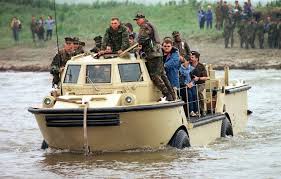
记忆方法
记忆“amphibious”的方法是将其拆分为两部分:“amphi-”和“-bious”。其中,“amphi-”来自希腊语,意味着“两边的”或“两者之间的”,而“-bious”常与“生物”或“有生命的”有关。你可以想象一个生物(如青蛙)既能生活在水中又能生活在陆地上,这就是“amphibious”的双栖特性。通过这样的联想,单词“amphibious”就容易被记忆了。
以上内容由AI生成, 仅供参考和借鉴
英语词源
- amphibious
-
amphibious: [17] The Greek prefix amphimeant ‘both, on both sides’ (hence an amphitheatre [14]: Greek and Roman theatres were semicircular, so two joined together, completely surrounding the arena, formed an amphitheatre). Combination with bios ‘life’ (as in biology) produced the Greek adjective amphibios, literally ‘leading a double life’. From the beginning of its career as an English word it was used in a very wide, general sense of ‘combining two completely distinct or opposite conditions or qualities’ (Joseph Addison, for example, used it as an 18th-century equivalent of modern unisex), but that meaning has now almost entirely given way to the word’s zoological application.
At first, amphibious meant broadly ‘living on both land and water’, and so was applied by some scientists to, for example, seals; but around 1819 the zoologist William Macleay proposed the more precise application, since generally accepted, to frogs, newts, and other members of the class Amphibia whose larvae have gills but whose adults breathe with lungs.
=> biology - amphibious (adj.)
- 1640s, from Greek amphibios "having a double life" (see amphibian). Of motor vehicles, from 1915.
权威例句
- 1. A third brigade is at sea, ready for an amphibious assault.
- 还有一个旅已在海上待命,准备两栖进攻。
- 2. At home both in water and on land, the platypus is amphibious.
- 鸭嘴兽的家可以在水中,也可以在陆上.它是两栖动物.
- 3. The British Army used these amphibious crafts in military operations in Borneo.
- 英国军队曾用这种水陆两用交通工具在婆罗州作过军事演习.
- 4. They proposed a heavy and concentrated amphibious assault.
- 他们计划进行一次猛烈而集中的两栖攻击.
- 5. At last I found this amphibious creature.
- 最后我找到了这个两栖动物.